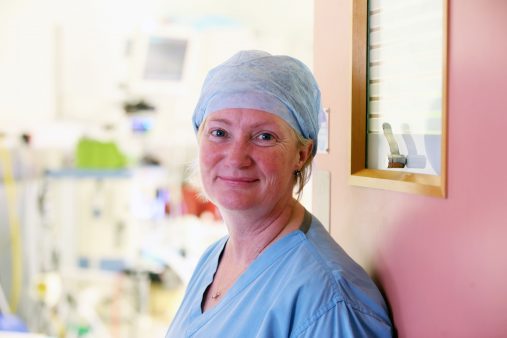The Phoenix Project: “Together we can achieve such a lot.”
22 November 2016
Judith Hall OBE (MD 2002) is Professor of Anaesthetics, Intensive Care and Pain Medicine at the Cardiff University School of Medicine, and Phoenix Project Lead. Here, she discusses her work and that of the University in Namibia, and how Cardiff students are changing lives for the better in Africa.
Once upon a time, feels like a long time ago, I was asked what we, Cardiff University, could do to meaningfully support International Development.
Feels like a long time ago, but it’s actually only 36 months of operation. In that time, from a standing start, with friends and colleagues in Cardiff University, we have made a major project happen.
This is the Phoenix Project, a programme of work involving very many people and specialities and designed to impact on the lives of real people. Those people are in Namibia, in sub-Saharan Africa, but they are also in Wales. There is no doubt that this sort of work transforms the lives of those who contribute, both personally and professionally. We have evidence for this powerful transformative effect in the project’s reflective diaries.
The Phoenix Project partners with the University of Namibia, an organisation like our own, with similar energy and vision. We are partners with common goals and direction of travel. It is born from our communal desire to make a difference to people’s lives. In response to the United Nations Sustainable Development Goals every single thing we do intends to either reduce poverty or promote health. Together we can achieve such a lot. It takes your breath away.
For me, the experience has been both been intense and inspirational. There are too many impacts to mention, but a few special highlights for me are:
- the development of anaesthesia as a speciality;
- creating an independent software community in Namibia;
- sharing best practice with senior nurses and midwives, and watching these skills disseminate out;
- making scientists through supporting maths education;
- using our own multi-lingual roots to assist communication and cultural understanding;
- finally, it’s very important to me that we have involved all of our Colleges and Professional Services.
I realise, however, there is still such a lot to do. You can’t partner with a developing country in sub-Saharan Africa and expect to walk away in as little as three years.
As Cardiff University moves forward, there is no doubt that our international identity is very important. The Phoenix Project is just one example of our global participation, and a successful one. Staff and students across the whole of Cardiff University, and their University of Namibia partners, want to carry on, to ever increasingly make a difference.
- April 2024
- March 2024
- February 2024
- January 2024
- December 2023
- November 2023
- October 2023
- September 2023
- August 2023
- July 2023
- June 2023
- May 2023
- April 2023
- March 2023
- February 2023
- January 2023
- November 2022
- October 2022
- September 2022
- August 2022
- July 2022
- June 2022
- May 2022
- April 2022
- March 2022
- February 2022
- January 2022
- December 2021
- November 2021
- October 2021
- September 2021
- August 2021
- July 2021
- June 2021
- May 2021
- April 2021
- March 2021
- February 2021
- January 2021
- December 2020
- November 2020
- October 2020
- September 2020
- August 2020
- July 2020
- June 2020
- May 2020
- April 2020
- March 2020
- January 2020
- December 2019
- November 2019
- October 2019
- September 2019
- August 2019
- July 2019
- May 2019
- April 2019
- March 2019
- February 2019
- January 2019
- December 2018
- November 2018
- October 2018
- September 2018
- August 2018
- July 2018
- June 2018
- May 2018
- April 2018
- March 2018
- February 2018
- December 2017
- November 2017
- October 2017
- September 2017
- August 2017
- July 2017
- June 2017
- May 2017
- April 2017
- March 2017
- February 2017
- January 2017
- November 2016
- October 2016
- September 2016
- July 2016
- June 2016
- May 2016
- April 2016
- March 2016
- February 2016
- January 2016
- December 2015
- November 2015
- October 2015
- September 2015
- August 2015
- January 2015
- December 2014
- November 2014
- September 2014
- August 2014
- May 2014